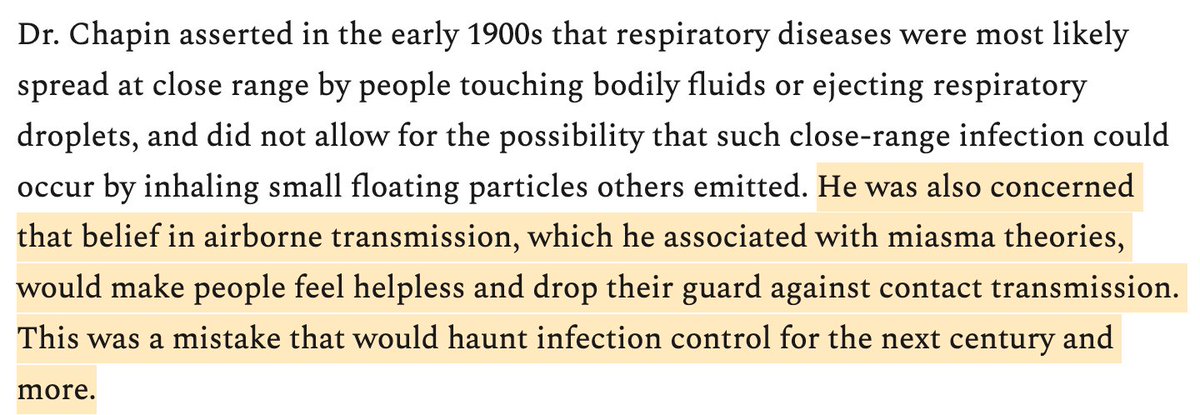This piece is well worth a read.
There is some overlap between the points it makes and the ones I made in the thread quoted.
https://www.theinsight.org/p/the-few-sentences-that-explain-much">https://www.theinsight.org/p/the-few... https://twitter.com/kerry62189/status/1364094550139092993">https://twitter.com/kerry6218...
There is some overlap between the points it makes and the ones I made in the thread quoted.
https://www.theinsight.org/p/the-few-sentences-that-explain-much">https://www.theinsight.org/p/the-few... https://twitter.com/kerry62189/status/1364094550139092993">https://twitter.com/kerry6218...
Here& #39;s something I think is important to emphasize: the public health field has *never* had this right. There wasn& #39;t a shocking failure or regression here. The political atmosphere and some other things sure didn& #39;t help with self-correction, but the problem pre-dated all of it.
Moreover, the failings being complained of now have been going on for a full century. This is the only behavior we& #39;ve ever known from public health officials, and despite the many medical achievements over the last century, the officials just didn& #39;t feel a need to update.
I& #39;m don& #39;t really say this to criticize the public health officials (and, of course, many individual officials have been great), because I think their reasoning could be justifiable in each particular case. My point is that the incentives/expectations lead to long-term disaster.
I can entertain the idea that some "simplification" to get better results is okay..but such opinions were always *meant* to be understood largely as guidance and PR, as part of an overall strategy. That& #39;s why we have public health officials--to handle the *public* aspect.
I mean, it& #39;s not like this description of Chapin makes him sound incompetent or crazy. He may have made a different call in 2020, given the circumstances. The problem is that his successors seemed unable to make their own calls--they weren& #39;t lying so much as shutting their eyes.
They were never supposed to be making 100% correct nuance-free factual statements that could be turned into mandatory, permanent rules. That they were forced into that position was largely not their own doing, and greatly worsened the consequences of their propensity to "nudge."
The point is that too many people have a completely ridiculous model of what public health officials can realistically achieve, and forced their utopianism and/or historical ignorance upon the rest of us, with disastrous results. They are way too trusting and certain.
Public health officials opted for false certainty via simplification, which we all do sometimes. But any damage done by the false certainty should have been limited, because the guidance should not have been taken as gospel and ruthlessly enforced beyond realistic levels.
There was a mismatch in expectations--public health officials& #39; "lies" aren& #39;t really that shocking, given their own expectations. They merely wanted people to focus on what they could control, like hand-washing, because it remains unclear if much can be done about aerosols.
Particularly in the early 19c, when this all started, no one was going to be able to control airborne transmission. Accurate information about it was not of much use, so it was much easier to drop the issue and focus on what would actually help.
I do not think they would have quibbled over the possibility of airborne transmission if they had been explicitly asked to draft laws that would be universally enforced by the state for a period of indefinite duration. The stakes were not clear--everyone shifted responsibility.
Had they been asked in those terms, they probably would have still fixated on hand-washing and been weird about masks, but that& #39;s because their line of thinking before March 2020 went something like this....
1) There& #39;s not much we can do about this kind of virus but use common sense mitigation measures until it runs its course.
2) We& #39;ll keep prioritizing the public health measures that guard against chronic threats within our control, like handwashing, which we know kills some germs.
2) We& #39;ll keep prioritizing the public health measures that guard against chronic threats within our control, like handwashing, which we know kills some germs.
I see the WHO& #39;s reluctance to acknowledge the obvious as related to a feeling that it was irrelevant to giving sensible advice. *Even if* airborne transmission was happening, the historical default was *still not* to recommend masks or cessation of indoor activity.
Much of the frustration is rooted in the expectation that if airborne transmission is acknowledged to exist, officials then switch to a more appropriate and effective response. Any delay is thus seen as criminal, or at least perversely lacking in practical sense and urgency.
But, given the historical difficulties of controlling airborne transmission, there really wasn& #39;t much of an alternative plan on file. In many ways, the demand that they not focus on "absence of evidence" was just a call for more "play it safe"-style massaging of the facts.

 Read on Twitter
Read on Twitter


